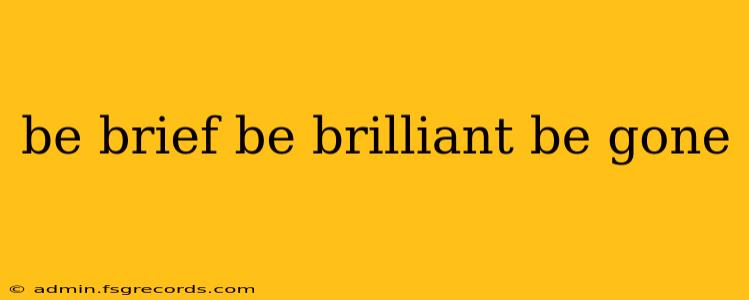In today's fast-paced world, the ability to communicate effectively and concisely is more valuable than ever. The phrase "be brief, be brilliant, be gone" encapsulates this ideal perfectly. It's a mantra for anyone seeking to leave a lasting impression, whether in business presentations, written correspondence, or even casual conversations. This post explores the key elements of this powerful communication strategy.
The Power of Brevity
Brevity isn't about sacrificing depth; it's about maximizing impact. Cutting unnecessary words and phrases forces you to focus on the core message, making your communication clearer and more memorable. Think of it as sculpting a statue – removing excess material reveals the beauty of the form.
- Identify your core message: Before you begin writing or speaking, clearly define the single most important point you want to convey. Everything else should support this central idea.
- Eliminate fluff: Words and phrases like "in essence," "basically," and "to be honest" often add nothing to the meaning. Cut them ruthlessly.
- Use strong verbs: Strong verbs add energy and clarity. Instead of "He walked slowly," try "He ambled" or "He sauntered."
- Embrace active voice: Active voice is more direct and engaging than passive voice. Instead of "The report was written by John," write "John wrote the report."
The Essence of Brilliance
Brilliance in communication isn't about using complex vocabulary or flowery language. It's about clarity, precision, and originality. It's about presenting your ideas in a way that is both insightful and memorable.
- Know your audience: Tailor your message to the specific audience you're addressing. What are their interests? What is their level of understanding?
- Use concrete examples: Illustrate your points with concrete examples and anecdotes to make them more relatable and memorable.
- Think critically: Before you communicate, take the time to carefully consider your ideas and ensure they are well-supported and logical.
- Practice your delivery: Whether you're writing or speaking, practice your delivery to ensure it is smooth, confident, and engaging.
The Art of a Graceful Exit
The "be gone" aspect emphasizes the importance of knowing when to end a communication. Dragging on after you've made your point dilutes its impact. A concise, well-crafted message leaves the audience wanting more – a far more powerful effect than rambling on until the point is lost.
- End with a strong conclusion: Summarize your main points and leave the audience with a clear takeaway.
- Avoid unnecessary details: Don't clutter your message with irrelevant information.
- Know your time limits: Be mindful of time constraints, whether you're giving a presentation or writing an email.
Mastering the art of "be brief, be brilliant, be gone" requires practice and discipline. But the rewards – clear, impactful communication that leaves a lasting impression – are well worth the effort. By focusing on brevity, brilliance, and a timely exit, you can elevate your communication skills and achieve greater success in all aspects of your life.

